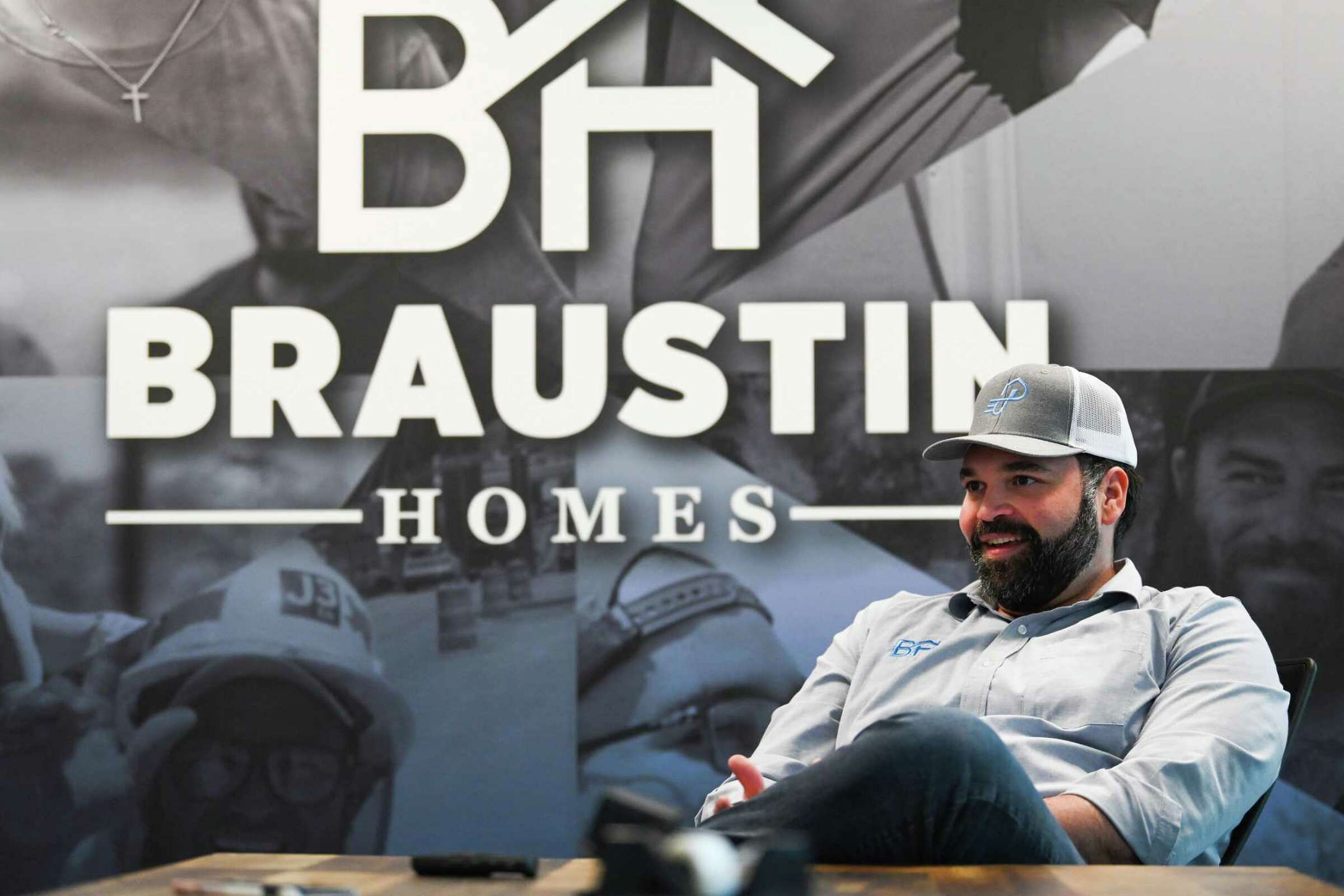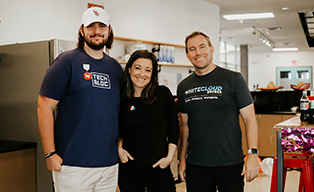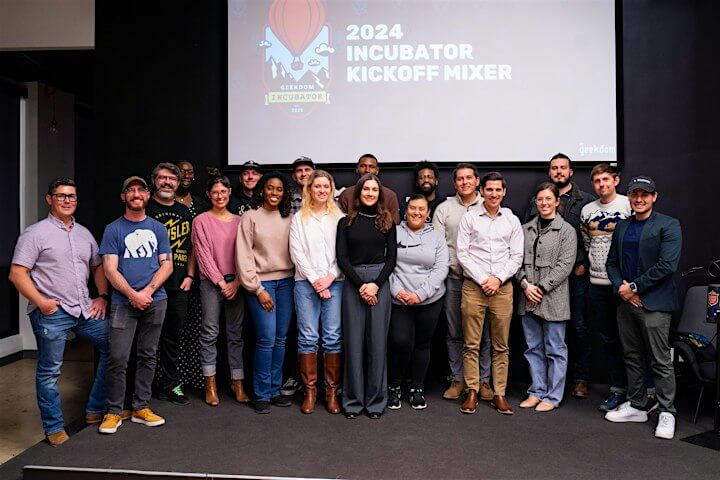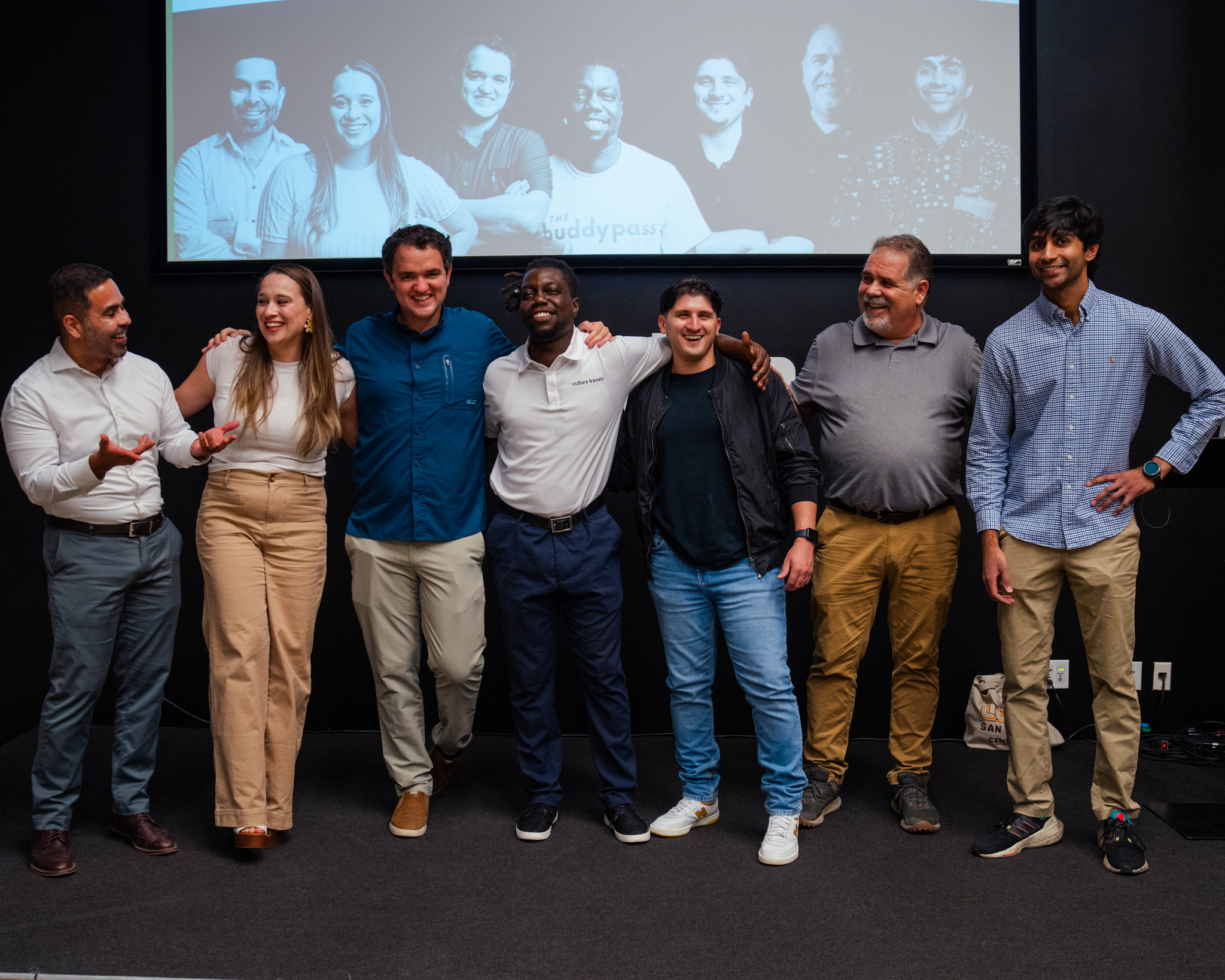
Alberto Pina talks about Braustin Homes, a manufactured housing company that he founded six years ago with his brother, Jason.
Billy Calzada / Staff photographer
While Braustin Homes, a locally based company that sells modular housing, was founded in 2017, it seems tailored to a post-pandemic world.
Its sales are done virtually, with its salespeople communicating to customers via emails, texts, phone calls and videoconferences. By bypassing traditional dealerships, it has done to the manufactured home industry what Carmax has done to auto sales and what companies such as Opendoor and Zillow have done to single-family real estate.
“There was a lot of things we were doing that seemed borderline crazy before the pandemic,” said Alberto Piña, who co-founded the business with his brother, Jason Piña. “I think there was a lot of customer adoption that happened through the (COVID-19) pandemic, where those things became more normalized, and not just for folks that grew up with computers.”
Apart from the pandemic, 2020 was a turning point for Braustin. In the fall of that year, it raised $1.9 million in a seed round, accepting investments from the likes of Graham Weston and Rackspace Technology Inc. co-founder Pat Condon in exchange for equity stakes in the company.
Since then, its payroll has roughly quadrupled; today, it has 38 full-time employees, Piña said. Formerly headquartered in Geekdom, the company moved last year into spacious digs at the Century Building, a 1970s-era office building near North Star Mall that has been renovated in modern tech style, featuring a podcast room and a bright, leafy atrium with a shuffleboard court.
After receiving the seed investment, the company opened its first dealerships where customers can tour model homes while speaking with salespeople who remain based in the headquarters. It now has two dealerships, one in Odessa and another on Interstate 35 about 20 miles southwest of San Antonio, and it is breaking ground on a third one near the crossing of Interstate 37 and Southton Road.
Last month, Braustin launched a financial technology, or fintech, product that Piña expects to propel its growth. Named PorchPass, it offers financing to prospective buyers of manufactured homes to help them line up the land and do the site work necessary for installing a home. Often, lenders won’t issue mortgages until that work is done, so it helps smooth out the process, Piña said.
The company began developing PorchPass because some of its deals were falling through due to the site work taking too long. After testing it internally, it has signed up a retailer to use it and it is in talks with a few others, Piña said.
“We found a way, internally, to take what was a three- to four-month process and bring it down to two to three weeks,” he said. “With this product, we can help other independent retails improve their service levels, not lose deals that they were losing because it took too long, the same way we were losing those deals.”
Piña recently sat with the Express-News to discuss the quality of manufactured homes, how the industry has changed and how rising housing costs have impacted demand. The following has been edited for brevity and clarity.
Q: Do you miss being at Geekdom?
A: Jason and I went to Geekdom because it was a cheap place to work. It had free internet, free printers. We started meeting folks that write code or just think different than what we’d been exposed to, coming up in the industry. There’s always new ideas. It’s just fun to be part of a building where everybody’s trying to build or create something new. What I don’t miss is we were really cramped in that building before we moved out. But I’m on the board of directors at Geekdom, so we still stay plugged in.
Q: All your sales are done virtually, right? Could you describe the process?
A: The system is designed to be whatever the consumer wants or needs it to be. Some people want Zoom; some people just want phone calls. A lot of texts and emails. What’s changed since the seed round is we now have physical dealerships. What’s different about this model is it’s the same six people out there. If you’re inside one of the models in person, you’re videochatting with them. We’re not there. We could run five, eight dealerships with the same six people, whereas the traditional dealership has five, six salespeople per dealership, and an operations manager, general manager.
Q: How do you make people comfortable buying a home they’ve never seen?
A: We’ve got virtual tours with Matterports, which are just as good as seeing it in-person. All sorts of pictures. Same with Zillow and Carmax — those are both instances where people make purchases without physically seeing a large-ticket item. So it’s not just us doing this; you buy Teslas without physically seeing a Tesla. There’s a lot of trust that a customer has to have — and we have to earn — for someone to make a $100,000 purchase in New Mexico or West Texas and just hope it shows up the way they thought it would. I think six years of doing that, now we have a track record.
Q: Where are the homes made?
A: Most of the factories are in the Dallas-Fort Worth area, Waco area. There’s a factory in Bonham. We’ve got a factory partner in Athens, Texas. All Texas factories, for the most part. There’s six major manufacturers.
Q: How good are the homes? Could you expect one to last 30, 40 years?
A: Yeah. The latest study, I believe it was the University of Georgia — 55 years is the average lifespan of these, with proper maintenance. Most of the homes we sell are Energy Star rated. You know, the product has come leaps and bounds. What we believe the problem is, is the modern product has advanced but the modern sales process, or the modern customer experience, has not changed from the 1970s.
Q: How are you addressing that?
A: The modern buyer doesn’t want to talk to salespeople. The modern buyer has grown up with Amazon, with companies like Carmax, where it’s a couple of clicks and it shows up on our door. I think that’s the primary disruption. The bulk of our customers, I would say, care more about the ease of the transaction, whereas saving money is just an added benefit. The last thing you want is some salesperson breathing down your neck like with used car sales back in the ’80s.
Q: I would imagine these homes need a foundation and stuff like that. What other work do you need to do?
A: We’re a full-service broker. We can do as much or as little as they need. Kind of like the buying process, everything about our platform and our systems is designed to be tailor-fit to the individual. Some folks just need the home, and maybe they’re a plumber by trade and they can connect all the utilities. Some folks need the home and land and full turnkey. We can do the foundations, electric, water.
Q: I think it’s safe to say that there’s been a stigma attached to manufactured housing. Is that changing?
A: 100 percent. My very first interview, way back when, I almost didn’t show up because I didn’t want to sell trailer homes. Then I walked through what the modern product is, a nice tape-and-texture triple-wide, and it’s nicer than the home I grew up in. Especially with millennials, that had a front-row seat to the housing crash in ’07, ’08, the starter home is a lot cooler to that generation. We had a front-row seat of what biting off too much house could do to you if it didn’t pan out. Then you look at stations like HGTV with their tiny home movement.
Q: Now that you’ve had your seed round, what are your future plans for growth? How will you raise the money for it?
A: That’s why we hired a (chief financial officer). He’s got a command knowledge of the capital markets. We’re working with debt partners now. When Jason and I started, we didn’t even know people would give you money to grow your business. We bootstrapped for four years because that’s all we knew. Now we’re rolling into the fintech space. We launched our first financial technology product in January. It’s something we proved for ourselves internally, but it’s tackling a problem that every retailer in the industry has. So that’s a different path of scaling. We think that’s where the bulk of the scalability of the company is going to come from.
Q: What is the price range of the homes right now?
A: Between mid-50,000s to $170,000, $180,000 on the high side.
Q: Have the prices gone up in recent years?
A: Yeah, it’s gone up quite a bit. Then it came down — still not pre-pandemic pricing. It was the perfect storm of supply chain disruptions. If you look at all the things that go into building a home, lumber was hit super hard. Then oil shut down as well. It’s surprising how many products stem from oil and gas — the plastics, the insulation. I’ve learned over the last two years more about the supply chain than I ever wanted to. Then you mix in supply and demand where people were trying to buy homes more than they had in a long, long while, and there just wasn’t enough supply of homes to go around. I think a lot of those things have stabilized now.
Q: Have the spiraling housing costs of recent years helped your business, with consumers looking for cheaper options?
A: To a degree it has. If you look at 2010, I believe 42 or 43 percent of new homes being built were sub-$200,000. You fast forward to now, it’s zero percent. That is a problem. We’re dealing with blue-collar and middle-class families. If they don’t get to participate in the real estate market, that’s their largest nest egg that never comes to manifest itself.
Richard Webner is a freelance business writer and former real estate reporter for the Express-News. He earned a graduate degree in journalism from the University of Missouri and an undergraduate degree in History from Northwestern University.






